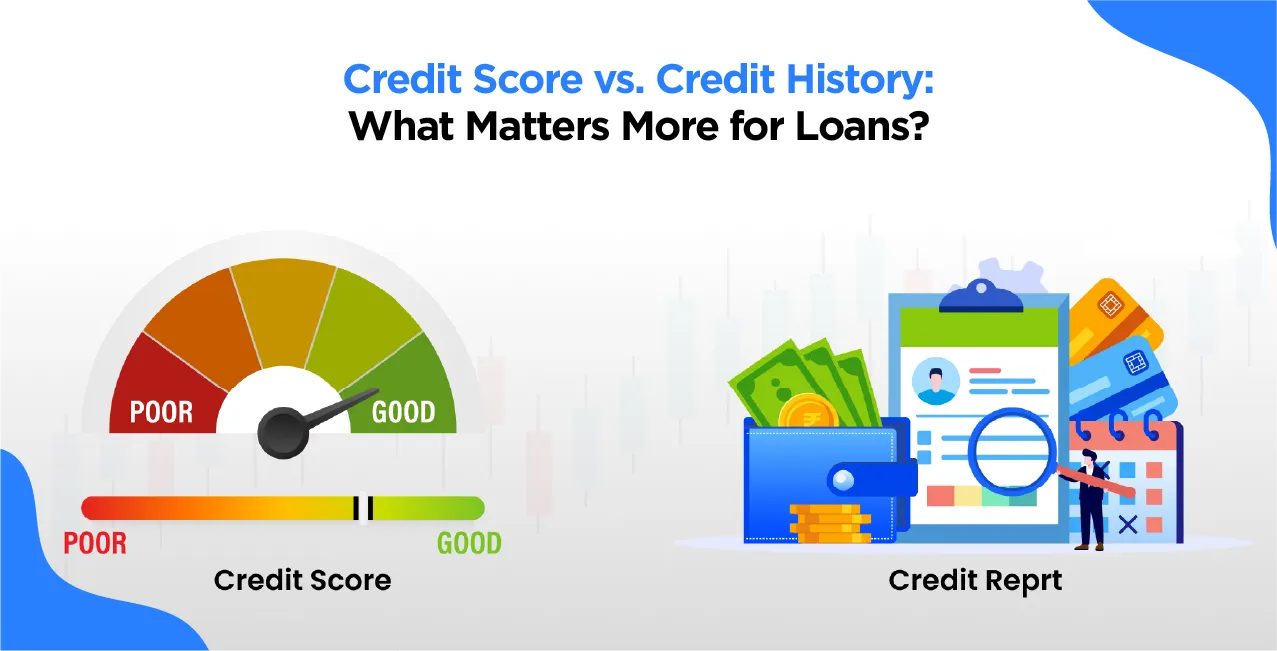Credit Score vs. Credit History: What Matters More for Loans?

Check Your Loan Eligibility Now
By continuing, you agree to LoansJagat's Credit Report Terms of Use, Terms and Conditions, Privacy Policy, and authorize contact via Call, SMS, Email, or WhatsApp
Raj, a young professional in Mumbai, eager to buy his first car. He applies for a loan, confident his steady income will secure approval. To his surprise, the bank rejects his application due to a low credit score.
Raj had always paid in cash and had no prior loans or credit cards, resulting in a limited credit history. This scenario is common in India, where both credit score and credit history play crucial roles in loan approvals.
According to data from the Credit Information Bureau (India) Limited (CIBIL), approximately 79% of loans are sanctioned to individuals with a CIBIL score of 750 or higher.
Credit history, on the other hand, is a detailed record of an individual's borrowing and repayment behavior over time. It includes information about past loans, credit card usage, payment patterns, and any defaults.
Lenders scrutinise this history to assess the risk of lending money to an applicant.
In Raj's case, his lack of credit history led to a low credit score, despite his stable income. This highlights the importance of building a good credit history to achieve a favourable credit score.
What is a Credit Score?
Imagine your credit score as your financial reputation in numbers. It’s a three-digit number ranging from 300 to 900 that tells lenders how trustworthy you are with money.
In India, banks and financial institutions use your credit score to decide whether to give you a loan or a credit card.
For example, if you’ve always paid your EMIs (Equated Monthly Instalments) and credit card bills on time, your score will likely be high, around 750 or above. A high score means banks are more likely to offer you loans with lower interest rates.
Read More - How to Know Your Credit Score – Step-by-Step Guide
On the other hand, missing payments or having too many unpaid loans can lower your score, making it harder to borrow money when you need it.
How is it Calculated?
Your credit score is based on:
- Payment history (35%): Have you paid your bills on time?
- Credit utilisation (30%): How much of your available credit do you use?
- Length of credit history (15%): How long have you used credit?
- Types of credit used (10%): Do you have a mix of loans, like home loans, personal loans, or credit cards?
- New credit enquiries (10%): How often do you apply for new credit?
For example, let’s say Ravi has a credit card with a ₹1,00,000 limit. If he regularly uses ₹30,000 and pays it back on time, his credit utilisation is 30%, which is considered healthy.
What is Credit History?
While your credit score is like your financial “mark sheet,” your credit history is the full report card. It’s a detailed record of every loan or credit card you’ve ever had—when you took it, how much you borrowed, and whether you paid it back on time.
Think of Seema, a small business owner who took a business loan of ₹5 lakh three years ago and repaid every EMI without missing a deadline. Her clean repayment record becomes part of her credit history, which lenders will check when she applies for future loans.
Credit history is maintained by credit bureaus like CIBIL, Experian, Equifax, and CRIF High Mark in India. This report includes:
- Loan amounts
- Repayment timelines
- Missed or delayed payments
- Defaults (if any)
Even if your credit score is decent, a bad repayment record in your history can make lenders think twice before approving your loan.
Key Differences Between Credit Score and Credit History
While credit score and credit history are closely linked, they are not the same. Here’s a simple breakdown:
Feature | Credit Score | Credit History |
Definition | A three-digit number (300-900) showing your creditworthiness | A detailed record of your borrowing and repayment behaviour |
Purpose | Gives lenders a quick idea of your financial health | Provides a complete picture of past financial behaviour |
Format | Single number | Detailed report |
Updated | Regularly updated, usually monthly | Updated when new loans or repayments are made |
Importance | Quick decision-making tool for lenders | Helps lenders understand repayment habits |
Example | Score of 800 = Excellent credit | Paid all EMIs on time over 5 years |
Which Matters More for Loans?
Both credit score and credit history are important for getting a loan, but they play different roles. Think of them as two sides of the same coin.
Let’s take Anil’s example:
- Anil has a high credit score of 780, but he missed a few EMIs on an earlier personal loan. His credit history will show those missed payments, which could make lenders cautious.
- On the other hand, Rahul has a score of 720, which is decent, but his spotless repayment record could convince lenders to offer him a loan at a favourable interest rate.
In most cases:
- For quick approvals: A high credit score matters more.
- For large loans: A solid credit history carries more weight.
Why Both Matter in India
In India, banks and financial institutions prefer borrowers with both a high score and a strong history. Even with a good score, your loan can be rejected if your credit history shows missed payments or defaults.
For first-time borrowers, it’s essential to build a strong credit history early on. You can do this by:
- Getting a credit card and paying bills on time.
- Taking small loans and repaying them responsibly.
- Keeping your credit utilisation below 30%.
Which Lenders Prioritise: Score or History?
When you apply for a loan, lenders look at both your credit score and credit history. But do they give more importance to the score or the history? The answer depends on the type of loan, the lender’s policies, and the amount you’re borrowing.
1. When Credit Score Matters More
Banks and Non-Banking Financial Companies (NBFCs) often focus on your credit score for:
- Quick loans like personal loans or credit cards
- Small loan amounts (₹50,000 – ₹5 lakh)
For instance, if you apply for a ₹1 lakh personal loan with a CIBIL score of 800, most lenders will quickly approve your request with a lower interest rate. The reason? A high score shows you’re financially responsible.
Example:
Priya, a salaried professional, applies for a ₹2 lakh personal loan. She has a credit score of 780, even though she hasn’t taken many loans before. The bank approves her loan because her high score signals low risk, even if her credit history is short.
2. When Credit History Matters More
Lenders prioritise credit history when:
- The loan amount is large (₹10 lakh or more)
- You’re applying for a home loan or business loan
- Your credit score is borderline (around 700-750)
For example, Ravi has a credit score of 720 but a spotless repayment record for a home loan over five years. When he applies for a new home loan, the bank will closely review his credit history and feel confident about his ability to repay based on his track record.
Quick takeaway:
- For quick, small loans: Credit score matters more
- For large, long-term loans: Credit history carries more weight
How Credit Score Affects Loan Interest Rates
Your credit score doesn’t just affect whether you get a loan, it also plays a big role in determining your interest rate. A higher score often means a lower interest rate, saving you money over time.
1. Why Does a Higher Score Get You a Lower Rate?
Lenders see people with high credit scores as low-risk borrowers. If your score is high, the bank assumes:
- You’ll pay EMIs on time
- You’re financially disciplined
- You’re less likely to default
To reward this, lenders offer lower interest rates.
Example:
Let’s say two people apply for the same loan:
Borrower | Credit Score | Loan Amount | Interest Rate | Monthly EMI (₹) | Total Interest Paid |
Rohan | 820 | ₹10 lakh | 8.50% | ₹20,754 | ₹4.71 lakh |
Sameer | 690 | ₹10 lakh | 11% | ₹22,915 | ₹5.89 lakh |
In this case:
- Rohan saves ₹1.18 lakh on interest because of his higher credit score.
- Sameer pays more due to his lower score.
2. What Score Do You Need for Low Interest Rates?
Here’s a simple guide for Indian borrowers:
- 750 – 900: Excellent → Lowest interest rates
- 700 – 749: Good → Competitive rates
- 650 – 699: Fair → Higher rates but loans still possible
- Below 650: Poor → Very high rates or loan rejection
Tip: Always aim to keep your score above 750 for the best deals on interest rates.
Which Matters More: Final Thoughts for Borrowers
Both your credit score and credit history are important, but their importance can vary depending on the loan type:
Loan Type | Credit Score Priority | Credit History Priority |
Personal Loan | High | Medium |
Medium | High | |
Car Loan | High | Medium |
Business Loan | Medium | High |
Final Advice for Borrowers
If you’re applying for a loan soon:
- Aim for a score of 750+ → You’ll get better interest rates.
- Maintain a clean credit history → Consistent repayments make you a trustworthy borrower.
- Monitor your credit regularly → Fix errors early to avoid rejections later.
The Role of Credit History in Loan Approval
Even if your credit score looks good, lenders dive deeper into your credit history to check:
- Have you missed any payments in the past?
- Have you defaulted on any loans?
- How often do you take loans?
A solid history shows consistency, while gaps or missed payments raise red flags for lenders.
1. Why Lenders Care About Credit History
Imagine you’re a bank manager. Two applicants apply for the same loan:
- Anjali: Credit score of 770 but missed payments on a credit card 3 years ago.
- Neha: Credit score of 750 with a clean repayment history.
Even though Anjali has a higher score, lenders might favour Neha because of her spotless repayment record. A clean history builds trust over time.
2. What Lenders Look For in Your Credit History
- Timely payments: Regular EMI payments show responsibility.
- Length of credit history: Longer histories give lenders more confidence.
- Credit mix: Having both secured (home loan) and unsecured (credit card) loans shows balanced borrowing.
- Recent defaults: Any recent missed payments can hurt your chances of approval.
Example:
Ramesh, an entrepreneur, applies for a ₹20 lakh business loan. His score is 740, which is decent, but his consistent repayments on a previous ₹10 lakh loan make his credit history strong. His application is approved because of his responsible track record.
3. How to Build a Strong Credit History
- Pay EMIs and credit card dues on time
- Avoid taking too many loans at once
- Keep your credit card utilisation below 30%
- Review your credit report regularly to fix any mistakes
Also Read - How to Build a Strong Credit Score from Scratch
The Impact of Recent Credit Activity on Loan Decisions
Lenders don’t just look at your score and history—they also check your recent credit activity. This refers to the loans you’ve recently taken or the number of times you’ve applied for credit in the past few months.
Why Do Lenders Care About Recent Activity?
If you’ve applied for many loans or credit cards recently, lenders may see you as:
- Financially unstable
- Desperate for credit
- A higher risk for defaults
Example:
Consider Neha, who applied for five different credit cards in two months. Her credit score remained at 720, but lenders rejected her loan application because of her frequent credit requests. This made her seem like she was relying too much on borrowed money.
How Much is Too Much?
If you apply for more than 2-3 loans or credit cards in six months, lenders may consider it risky. Every application also triggers a hard enquiry, which can lower your credit score by a few points.
How Does Recent Credit Activity Affect Loan Approval?
Here’s a simple comparison:
Recent Credit Activity | Effect on Loan Approval |
No recent credit activity | Neutral or slightly positive |
1-2 loan/credit card applications | No major impact if score and history are good |
More than 3 applications in 6 months | Increases chances of loan rejection |
Large recent loans | Lenders may worry about repayment ability |
Tip: Avoid applying for multiple loans or credit cards in a short period. Instead, space out your applications to protect your credit score and improve approval chances.
Conclusion
A good credit score helps you get loans faster, while a strong credit history builds long-term trust with lenders. If you’re planning to take a loan soon, focus on both:
- Pay your EMIs and credit card bills on time.
- Keep your debts manageable.
- Avoid too many loan applications in a short time.
In the end, if it’s buying a house or funding your child’s education, a healthy credit profile can open doors to better financial opportunities.
Other Informative Pages | |||
Should You Close Old Credit Cards to Improve Your Credit Score | |||
About the author

LoansJagat Team
Contributor‘Simplify Finance for Everyone.’ This is the common goal of our team, as we try to explain any topic with relatable examples. From personal to business finance, managing EMIs to becoming debt-free, we do extensive research on each and every parameter, so you don’t have to. Scroll up and have a look at what 15+ years of experience in the BFSI sector looks like.
Subscribe Now
Related Blog Post
Recent Blogs
All Topics
Contents
Quick Apply Loan
Consolidate your debts into one easy EMI.
Takes less than 2 minutes. No paperwork.
10 Lakhs+
Trusted Customers
2000 Cr+
Loans Disbursed
4.7/5
Google Reviews
20+
Banks & NBFCs Offers
Other services mentioned in this article








